As life evolves in surprising or disturbing ways, deep human concerns often cause anger or resentment toward whichever spiritual power a person acknowledges. Engaging one’s spiritual needs has a measurably favorable impact on their health outcome (Hight, 2001). Especially in secular hospital settings, spirituality goes beyond religion... to include non-religious spiritual sources (e.g. nature, music, art, or scientific inquiry).
One ultimate reality is the “act” that creates everything we can see and touch, including the unseen nature of the creator (some call God or the transcendent). Besides this ontological act of creation... there are four cosmological ultimate realities that profoundly affect the human condition: obligation, wholeness, affiliation, and meaning.
Whimsical art[1] and spiritual questions[2] may help some engage their deeper self through life’s ultimate realities distilled from Buddhist, Hindu, Jewish, Islamic, Chinese, and Christian traditions.[3]
Rev. Bill Taylor
[1] With permission of James Christensen @ www.greenwichworkshop.com.
[2] Hight, G. A. (2001). Spirituality and Medical Practice: Using the HOPE: Questions as a Practical Tool for Spiritual Assessment. American Family Physician.
[3] Neville, R. C. (2014). Philosophical Theology: Ultimates. Albany: State University of New York Press.
Rev. Bill Taylor
[1] With permission of James Christensen @ www.greenwichworkshop.com.
[2] Hight, G. A. (2001). Spirituality and Medical Practice: Using the HOPE: Questions as a Practical Tool for Spiritual Assessment. American Family Physician.
[3] Neville, R. C. (2014). Philosophical Theology: Ultimates. Albany: State University of New York Press.
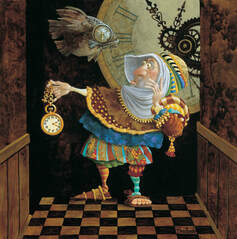
Regarding the ultimate act of creation, humans notice strange or unexpected conditions not caused by mankind. Chief among the Surprises in Creation is how the world came to exist and why there is an earth and sky, rather than nothing at all? A person’s spiritual beliefs begin to surface when considering whether they feel gratitude or resentment for their life here on earth and whether life worth living.
Regarding the ultimate act of creation, humans notice strange or unexpected conditions not caused by mankind. Chief among the Surprises in Creation is how the world came to exist and why there is an earth and sky, rather than nothing at all? A person’s spiritual beliefs begin to surface when considering whether they feel gratitude or resentment for their life here on earth and whether life worth living.
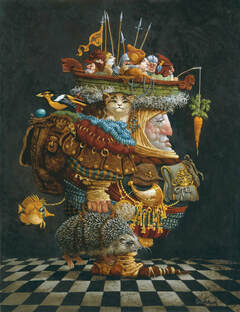
The ultimate reality of obligation explores our values and feelings of guilt, shame or gratitude toward God, society, and family... Living Under Obligation. Each person’s character and worldview are based on moral, social, personal, and natural “values” learned from our family, society, and religion.
How each person exercises freewill reveals that person as “better” or “worse” based on their obligation or duty toward family, society and God. Spiritual questions that engage obligation might include: is our sense of obligation impeded by fear, guilt, or shame from avoiding a moral duty toward God or whatever we consider our higher power?
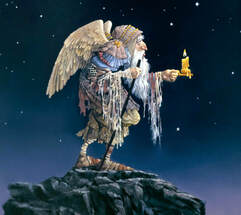
The ultimate quest for wholeness is challenged by Life’s Predicaments or unwanted events and circumstances... causing some people to turn away from God. This reality notices that life’s punishments and rewards do not add up... which affects how we think, value, and act. A range of troubling concerns (e.g. money, health) can change one’s ultimate feeling toward God, as more resentful or grateful. Secular questions that help explore the reality of wholeness include: Facing uncertainty, what are your sources of hope, comfort and peace? What helps you cope with life’s most challenging circumstances? Do you attribute unwanted events or circumstances to God or some higher power?
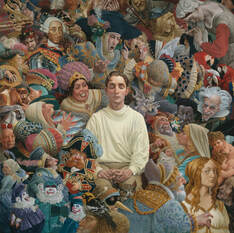
The ultimate reality of affiliation revolves around the extent of “engagement with” or “isolation from” both people and nature in the world around us. Connection with the Other... reveals the degree of harmony that people engage with other things, our natural world, and other people.
Consider how do we act toward people or groups we dislike? How do each person act toward earth’s resources required to support their own human life... including the land, water, and air we breathe? During troubling times... do you feel more isolated or connected with others?
Consider how do we act toward people or groups we dislike? How do each person act toward earth’s resources required to support their own human life... including the land, water, and air we breathe? During troubling times... do you feel more isolated or connected with others?
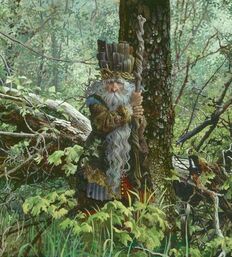
The ultimate reality of meaning is the quest for building a life that has value and purpose... seen in one’s Personal Identity. People often wonder if their failures and accomplishments stand in judgment before God, and bet their lives on the set of ultimate truths they integrate into their life. Each person might explore: In your life... what provides your inner self with meaning, value, and purpose?